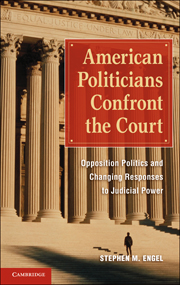 American Politicians Confront the Court
American Politicians Confront the Court Book contents
- Frontmatter
- Contents
- Acknowledgments
- Introduction
- PART I POLITICAL DEVELOPMENT AND ELECTED-BRANCH RELATIONS WITH THE JUDICIARY
- PART II HOSTILITY TO JUDICIAL AUTHORITY AND THE POLITICAL IDIOM OF CIVIC REPUBLICANISM
- 3 In Support of Unified Governance
- 4 Party against Partisanship
- 5 “As Party Exigencies Require”
- PART III HARNESSING JUDICIAL POWER AND THE POLITICAL IDIOM OF LIBERAL PLURALISM
- On the Return of Opposition Illegitimacy and the Prospects for New Development
- Index
- References
5 - “As Party Exigencies Require”
Republicanism, Loyal Opposition, and the Emerging Legitimacy of Multiple Constitutional Visions
Published online by Cambridge University Press: 05 June 2012
- Frontmatter
- Contents
- Acknowledgments
- Introduction
- PART I POLITICAL DEVELOPMENT AND ELECTED-BRANCH RELATIONS WITH THE JUDICIARY
- PART II HOSTILITY TO JUDICIAL AUTHORITY AND THE POLITICAL IDIOM OF CIVIC REPUBLICANISM
- 3 In Support of Unified Governance
- 4 Party against Partisanship
- 5 “As Party Exigencies Require”
- PART III HARNESSING JUDICIAL POWER AND THE POLITICAL IDIOM OF LIBERAL PLURALISM
- On the Return of Opposition Illegitimacy and the Prospects for New Development
- Index
- References
Summary
In contrast to Martin Van Buren's ideas about a disloyal aristocratic minority opposition and single-party constitutionalism, Abraham Lincoln, as the first Republican president and a consummate party politician, conceded the political opposition's right to rule and endorsed the idea that constitutional interpretations could legitimately vary. Lincoln's ideational innovation was compelled by the secession crisis, and it carried vast consequences for how future politicians would manipulate judicial power. Just as the Framers relocated the source of sovereignty from the legislature to the people in order to stem the crisis of governance created by the Articles of Confederation, and just as Van Buren altered the meaning of party from an institution inimical to civic health to one that promoted civil stability in an effort to end the “corruption” against which the Madisonian design proved ineffectual, Lincoln, seeking to prevent the complete breakup of the republic, would re-define the status of opposition and, with it, the notion of what counted as legitimate constitutional interpretation.
This chapter begins by detailing politicians' ideas about opposition and party during the 1850s and 1860s. The first section examines how early Republican leaders, especially William Seward, characterized Democrats in civic republican terms, that is, as an anti-constitutional conspiracy, and cast Republicans not just as competitors but also in the Van Burenite framework of a singular constitutional party replacement.
- Type
- Chapter
- Information
- American Politicians Confront the CourtOpposition Politics and Changing Responses to Judicial Power, pp. 170 - 222Publisher: Cambridge University PressPrint publication year: 2011


